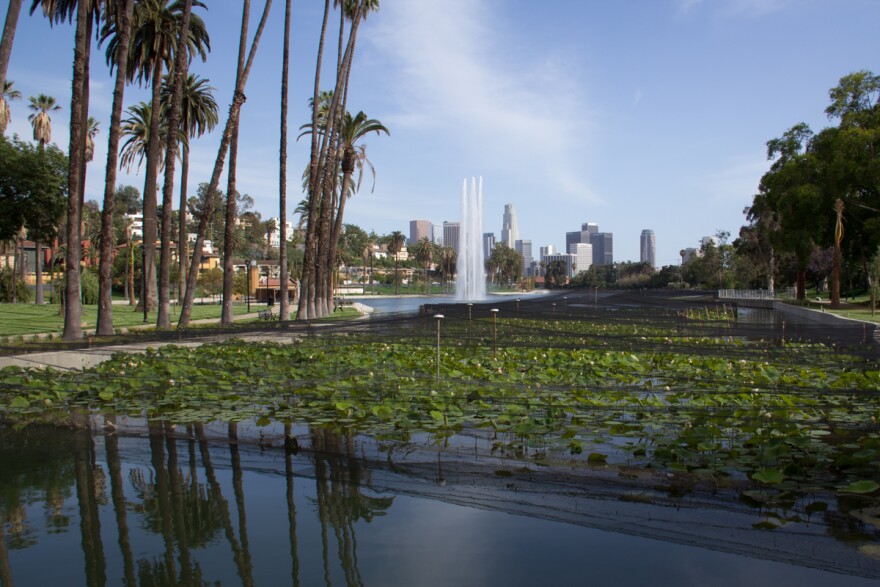This story is free to read because readers choose to support LAist. If you find value in independent local reporting, make a donation to power our newsroom today.
This archival content was originally written for and published on KPCC.org. Keep in mind that links and images may no longer work — and references may be outdated.
Echo Park Lake to restrict RV parking. But will it work?

Echo Park Lake has undergone a transformation over the past few years after a $45 million renovation was completed in 2013. But city officials are increasingly concerned that along with families and tourists, the park's perimeter is crowded with RV's.
On Wednesday, the L.A. City Council voted to ban overnight parking for oversized RV's on the streets surrounding the park.
"There is an increased problem with oversized vehicles parking along various streets surrounding Echo Park Lake where these large vehicles are often parked overnight and constrict travel lanes, thereby creating dangerous situations," Council Member Mitch O'Farrel wrote in the motion.
Such restrictions have proliferated in Los Angeles as the homelessness crisis has grown in the city. Last year, the city council authorized over 80 oversized vehicle parking restrictions for various clusters of streets in the city, compared to about 50 in 2016.
There are an estimated 11,000 people living in RV's, vans, and cars in L.A. County.
It's unclear what impact the growing number of parking restrictions has ultimately had — a question Council Members Bob Blumenfield and Mitch Englander want studied. They've introduced a motion, up for a vote Friday, instructing transportation officials to study what other cities have done to reign in RV's.
In their motion, the council members note the number of RV's on residential streets has increased along with L.A.'s homeless population, irritating neighbors.
"Los Angeles is experiencing an unprecedented growth in the number of individuals living in recreational vehicles and on public streets," Englander said in an email. "Neither the public right of way, nor the vehicles were intended for habitability in the City's zoning or municipal codes. While some decisions have been made in response to court rulings, it is essential that standards for habitability and public health and safety within our neighborhoods be established. It is prudent to look to other municipalities that have established regulations for these vehicles. Examining best practices and learning from the challenges faced by other cities is just common sense due diligence."
O'Farrel's office did not respond to requests for comment.
L.A. also bans homeless people from parking their vehicular homes, whether an RV or a sedan, next to a school or park. That restriction seems to have had little impact at Echo Park Lake, where seven RV's sat parked on Tuesday morning, at least some of them inhabited.
Inside one, Tony Pena stood over his stove, fixing a breakfast of cheese quesadillas for three friends who live in the park.
"I was born and raised right here on Echo Park Avenue, I've been coming here ever since I can remember," he said. "It's a shame I've been here all my life and now they're telling me I can't come camp out here."
His friend, Marshall Roper, seated on the RV's couch, said vehicular homeless choose the park because of the facilities and the vibe.
"You always pick spots for two things, running water and a bathroom," Roper said. Echo Park Lake also draws people who enjoy the view, the weekend food trucks, and the safe neighborhood, he said.
If forced to move from 2a.m. to 6a.m., he said, RV's will probably park on a neighboring street and then head back to the park when the sun comes up.
This story has been updated.







